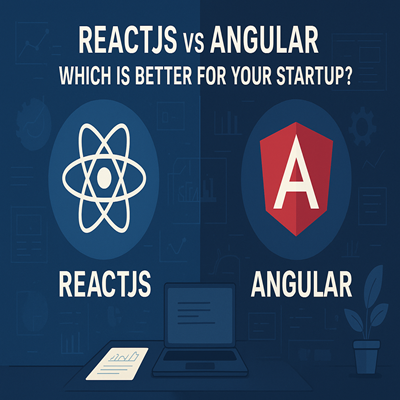
Choosing the right front-end framework can make or break your startup’s digital product. With ReactJS and Angular leading the market, deciding between them is a crucial early decision. Both are powerful, backed by tech giants (Meta and Google), and have thriving communities. But which one is best suited for your startup’s unique needs?
In this blog, we’ll break down the differences between ReactJS and Angular based on performance, scalability, learning curve, development speed, and more.
1. Overview: ReactJS and Angular
ReactJS:
Developed by Meta (Facebook)
A JavaScript library for building UI components
Follows a component-based architecture
Uses a virtual DOM for faster performance
Angular:
Developed by Google
A complete front-end framework
Built with TypeScript
Provides built-in tools like routing, HTTP, and form management out-of-the-box
2. Performance and Speed
ReactJS:
Uses virtual DOM, enabling faster rendering and updates
Lightweight and flexible for high-performance UIs
Ideal for apps with complex UI and frequent updates
Angular:
Uses real DOM, which may slow down performance in larger apps
Heavier initial load due to being a full framework
However, optimization features like Ahead-of-Time (AOT) compilation help mitigate some performance issues
Verdict: ReactJS often wins in terms of raw performance, especially for lightweight or dynamic applications.
3. Learning Curve
ReactJS:
Easier for developers with JavaScript experience
Offers more flexibility and less opinionated structure
However, it requires third-party libraries for routing and state management
Angular:
Steeper learning curve due to TypeScript and inbuilt complex tools
Developers need to learn concepts like dependency injection, RxJS, and decorators
Verdict: ReactJS is easier for startups to onboard new developers and ramp up faster.
4. Scalability and Structure
ReactJS:
Highly flexible but can lead to inconsistent codebases without proper guidelines
Better suited for smaller, MVP-style apps that may scale later
Angular:
Comes with strong opinions and architecture
Built-in solutions like services, guards, and routing offer better structure for enterprise-grade applications
Verdict: Angular is more scalable and structured for long-term growth, especially in large teams.
5. Ecosystem and Community Support
ReactJS:
Massive community with abundant libraries and third-party tools
Supported by Facebook and widely adopted in startups and tech companies
Angular:
Also has a strong ecosystem
Heavily used in large enterprise applications, especially by corporations
Verdict: ReactJS has wider startup adoption and more freedom, while Angular has strong enterprise backing.
6. Time to Market
ReactJS:
Faster to get started, especially for MVPs
Lightweight, allowing rapid prototyping and quick pivots
Angular:
Requires more setup time and developer onboarding
However, once set up, Angular provides a complete toolkit
Verdict: ReactJS is ideal for startups aiming to launch fast.
Final Verdict: Which One is Better for Your Startup?
If your startup is aiming for fast time-to-market, needs a flexible UI, and wants a shallow learning curve, ReactJS is the way to go.
However, if you’re building a feature-rich, scalable product with a structured codebase and long-term growth in mind, Angular may serve you better.
Ultimately, the best choice depends on your startup’s specific goals, team expertise, and product roadmap.
